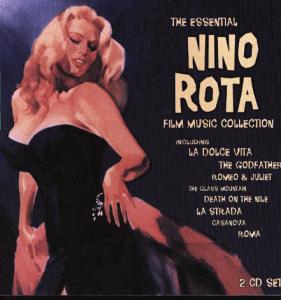************************************************************** EDITOR’s RECOMMENDATION June 2003 **************************************************************
The Essential Nino Rota
CD1
The Taming of the Shrew, The Glass Mountain, Romeo & Juliet, Death on the Nile, The Godfather, The Godfather Part II, Juliet of the Spirits, La Dolce Vita
CD2
Histoires Extraordinaires, The White Sheikh, 8˝, I Vitelloni, The Swindle, The Nights of Cabiria, Boccaccio 70, Fellini Satyricon, The Clowns, Roma, Amacord, Casanova, Orchestra Rehearsal, La Strada
The City Of Prague Philharmonic Conducted by Derek Wadsworth, Paul Bateman, Nic Raine, Mario Klemens
Available On: SILVA SCREEN FILMXCD 369 Running Time: 114:50 [Disc 1: 56.47; Disc 2: 58.03]
Crotchet Amazon UK

First of all it should be said that most of the material in this compilation comprises reissues of music already released by SILVA SCREEN with the exception of the cues: Nile Journey, Histoires Extraordinaires and Legend of the Glass Mountain. The last mentioned is particularly welcome. The Glass Mountain was a 1949 British film about an RAF officer and aspiring composer who is shot down in the Italian Dolomites and nursed by a local girl with whom he falls in love –’trouble is, he has a wife back home so the inevitable emotional tussle ensues. The music from the film featured the great Italian baritone Tito Gobbi and its main theme, the ‘Legend of the Glass Mountain’ became exceedingly popular at the time. ‘Nile Journey’ comes from Death on the Nile, one of those star-studded Agatha Christie who-dunnit adaptations. It is a nice broad evocation of the majestic Egyptian river. From Histoire Extraordinaires, comes the jolly scintillating jazz number ‘Toby Dammit’.
Romeo & Juliet is deservedly one of Rota’s most popular scores. It is graced by a suite of five substantial movements on CD1. Beautifully crafted it has exciting fanfares, lively period dance music, music of danger and intrigue and pathos; and, of course, that magic, tender love theme. CD1 begins with the ebullient music for another Shakespearean film adaptation, The Taming of the Shrew. The poignant Godfather love theme, redolent of Sicilian family sentimentality, is followed by more affecting, easily-recognisable music in the shape of the equally haunting ‘Sicilian Pastorale’ and the languid, and then flauntingly sensual ‘Finale’ from The Godfather II.
The seven-minute suite from Juliet of the Spirits, about a bored middle-aged woman seeking escape into an occult sensual world, is, in its opening passages, at once eerie, mysterious and full of unease but also redolent of Juliet’s essential childish innocence. Then a carefree carnival atmosphere predominates in this predominantly jazz/easy listening-based score with imaginative use of xylophone and celeste and persistent woodwind cuckoos. A splendid score, full of fun and pathos. CD1 is rounded off with a seven-minute suite from La Dolce Vita about decadence and debauchery in the Rome of the 1950s. Oily woodwinds, tense discords, high-stepping jazz interludes, and voluptuous, slinky music predominate, together with occasional material that hints back to Gregorian modes. This is the first of Rota’s scores for the films of Federico Fellini that occupy the bulk of this collection.
CD2 has the hedonistic extravagant escapist music from The White Sheikh followed by the hectic buffoonery and carnival atmosphere of 8˝ with its Khachaturian overtones. A beautiful refrain of romantic longing is heard from I Vitelloni before the music becomes cheeky and flirty for this film about five young men pursuing girls and getting into all sorts of trouble. High-spirited jinks alternating with engaging tenderness informs the music for The Swindle. A six-minute suite of music from The Nights of Cabria about an eternally optimistic, guileless prostitute’s fruitless search for ideal love underlines her innate goodness and childlike innocence in music of real enchantment and breezy jazz and Latin dance tunes. From the modern take of Boccaccio 70, there is exuberant, mischievous march music for the episode ‘The Temptation of Dr Antonio’ sequence in which a giant billboard illustration of a lasciviously-clad woman steps out of the picture to tempt a puritanical man. Music from another Fellini film, Satyricon, has material reflecting ancient modes before playful music redolent of sly naughty pleasures ensues; while Clowns with big bass drum and tipsy brass celebrates circus fun. Roma’s music contrasts the pomp and grandeur of sheer joy of Ancient Rome with the modern City’s harsher, grittier reality.
Amarcord was an amusing burlesque on the colourful characters Fellini remembered from his youth in a small town on the Adriatic. It inspired one of Nino Rota’s best-loved melodies full of fond nostalgia. Riotous and sensual episodes from the life and liberties of the 18th century scoundrel, Casanova drew contemporary, surprisingly dark music for this story that was ultimately about Casanova’s failures as much as his conquests. For the offbeat Orchestral Rehearsal, Rota provided humorous, insolent neo-classical material, reminiscent of Shostakovich or Stravinsky. Finally there is a 6˝ minute suite from La Strada another classic Rota score with that famous plaintive melody for solo trumpet and orchestra.
A very attractive compilation of Nino Rota’s very attractive, melodic film music – pity there wasn’t room for his classic score for Il Gatopardo (The Leopard).
Ian Lace
41/2
Return to Index